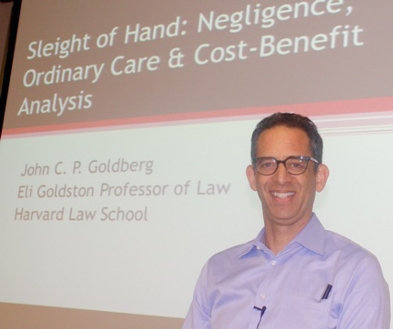Goldberg lectured on Ordinary Care in the Law of Torts
March 23, 2017
 John Goldberg, the Eli Goldston Professor of Law at Harvard University, delivered the second Tort Law Research Group Public Lecture of the 2016-17 academic year to an audience of students and faculty on March 13.
John Goldberg, the Eli Goldston Professor of Law at Harvard University, delivered the second Tort Law Research Group Public Lecture of the 2016-17 academic year to an audience of students and faculty on March 13.
Professor Goldberg is an expert in tort law, tort theory, and political philosophy, and co-author of a leading casebook, Tort Law: Responsibilities and Redress (4th ed. 2016), as well as The Oxford Introductions to U.S. Law: Torts (2010). He has also published dozens of articles and essays in scholarly journals. Of particular note, Professor Goldberg, along with co-author and collaborator Professor Benjamin Zipursky of Fordham Law School, is one of the founders of civil recourse theory, a competitor to both corrective justice and law and economic accounts of tort law.
In his talk, titled “Sleight of Hand: Negligence, Ordinary Care, and Cost-Benefit Analysis,” Professor Goldberg challenged a dominant approach to standard of care as a cost-benefit analysis.
It is a mistake to equate or reduce the standard of reasonable care to a balancing exercise of costs and benefit, a mistake that originated in law and economics scholar (and judge) Richard Posner’s interpretation of Judge Learned Hand’s algebraic formula in Carroll Towing: “if the probability be called P; the injury, L; and the burden, B; liability depends on whether B is less than L multiplied by P; i.e., whether B < PL.”
Posner argues for an economic interpretation of Hand’s formula: that liability in negligence arises when the costs of taking precautions are less than the product of the probability of the injury occurring and its extent. Posner’s analysis has been widely endorsed by legal practitioners, judges, and professors. Despite this, Professor Goldberg convinced us that Posner made “a hash out of the decision on which it relies.”
First, the question of fault at issue in Carroll Towing was not that of the defendant, but that of the plaintiff. Second, Learned Hand’s identification of the variables (B, P, and L) had procedural aims, not definitional aspirations. By drawing attention to the multiple facts in play when determining whether an individual fell below the standard of care, Learned Hand demonstrated that there could be no general rule. Thus, the trial judge’s decision in this case, which relied on such a general rule (that the absence of a bargee was not sufficient for negligence), was wrong in law, and this determination allowed Learned Hand to conduct a full-blown de novo review of the case.
Not only does the cost-benefit analysis approach to ordinary care not have the jurisprudential foundations that Posner wishes it had, but it also neither tracks the language used in ordinary care analyses—judges refer to what a reasonably prudent person would do, not to costs and benefits of activities—nor fits the doctrine’s fundamental features. For example, cost-benefit analyses cannot explain situations of “executory” fault, in which there is no opportunity for the agent to weigh costs and benefits of a careless action because the fault is in the doing. More important, Goldberg argued, that while failure of ordinary care is a breach of a relational duty that a defendant owed to persons such as the plaintiff, cost-benefit analyses are artificial if restricted to the plaintiff and the defendant.
For all of these reasons, Professor Goldberg counselled the rejection of the definitional role of cost-benefit analysis in determining the relevant standard of care. In its stead, he advocated a conception of ordinary care that is one of “civil competence.” According to this understanding, the duty to take care not to injure others is a basic obligation that we have a duty to discharge competently. An understanding of ordinary care as an obligation of competence, Professor Goldberg argued, fits with the above five features of ordinary care. Costs and benefits are discussed, Goldberg claimed, only to the extent that they are of procedural help in that they help courts avoid slipping from negligence into strict liability.
The Tort Law Research Group’s public lecture series is generously sponsored by Legate and Associates LLP, a firm that uses a client-centered team approach focused on getting to know each client and ensuring that he or she feels empowered. Founding lawyer Barbara Legate, a graduate of Western Law, has argued significant cases in a wide variety of situations, from administrative tribunals to the Ontario Court of Appeal. In both 2014 and 2010, Barbara was recognized by Best Lawyers in Canada as Lawyer of the Year in Personal Injury in London and Windsor





